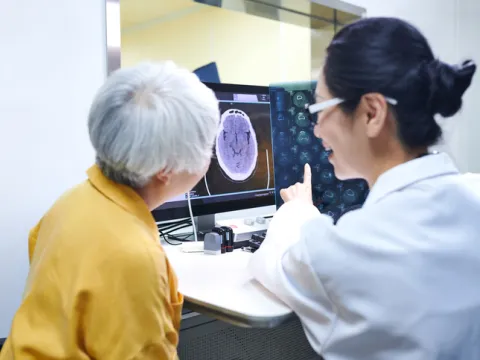- AdventHealth

What you need to know:
For those with advanced non-small cell lung cancer (NSCLC), having an inflammatory side effect, called an immune-related adverse event (irAE), from a monoclonal antibody treatment correlates with patients living longer, according to findings in a recent JAMA article co-written by Mark Socinski, M.D., thoracic medical oncologist and executive medical director of the AdventHealth Cancer Institute.
The big picture:
The American Society of Clinical Oncology lists NSCLC as the most common type of lung cancer in the U.S., accounting for 82% of all lung cancer diagnoses. For people with localized NSCLC, which means the cancer has not spread outside the lung, the overall 5-year survival rate is 63%.
In advanced NSCLC, the standard of care treatment in most patients is the combination of chemotherapy plus immunotherapy. This new research shows that patients who have irAEs after introducing an immunotherapy drug, in this case a monoclonal antibody called atezolizumab, is directly linked to improved survival.
About the research:
This published paper looked at three large, global phase 3 trials, all of which Socinski worked on, and asked the question:
If you had an immune-related adverse event (irAE), which means your immune system is turned
on and engaged, did the irAE correlate with survival of the patients?
Answer: Yes.
“We found if you had a mild to moderate irAE, suggesting the immune system is invigorated, reactivated, no longer sleeping, and is fighting the cancer - that it controlled the cancer better,” said Socinski. “There was some spillover to normal tissue with some side effects, such as a rash, diarrhea and colitis, and that’s actually a good thing.”

If a patient’s irAEs consists of mild-to-moderate side effects, it’s not necessarily a bad thing, Socinski explained. Physicians have supportive care to manage and minimize these types of side effects, which can also indicate the immune system is engaged.
“It follows the paradigm of, ‘no pain, no gain,’ said Socinski. “For example, having a rash might not be comfortable, but having an irAE means your immune system is in overdrive and working. If it’s working on your skin, then it’s also working on the cancer and controlling it.”
How it works:
One of the hallmarks of cancer is the evasion of the immune system. There are a number of checkpoints that can turn on or turn off the immune system. In the last decade, the main checkpoint important to controlling cancer growth is the PD-1/-L1 pathway.
When the immune system locates certain tumors and attempts to attack it, the tumor expresses PD-L1 and puts the immune systems T Cells, which is a type of white blood cell, into a state of dormancy.
Blocking the PD-1/-L1 pathway with antibodies unlocks the immune system dormancy and wakes the T Cells up so they can fight the cancer. There are several monoclonal antibodies that can block the pathways, including atezolizumab, studied here.
In some cases, when the immune system is awakened, it attacks normal tissue, called immune-related adverse events (irAEs). Upon evaluation, this study concludes that mild to moderate irAE from monoclonal antibody treatments correlates with improvements in survival rates.
What’s next:
Currently, this type of immunotherapy treatment with mild to moderate irAEs is being studied by Socinski in a large database analysis to determine if it can be extended beyond lung cancer.
Physician takeaway:
Question research as you read it and ask yourself, “Can it be taken a step further?” In addition, be creative in the way you come to your conclusion. Not every answer requires a clinical trial. Sometimes, as in this case, aggregating data and pooling analysis from multiple randomized clinical trials can help shed light on potential new treatment options.
To read the full JAMA-Oncology article, click here.
Recent News
Under a single compassionate use Investigational New Drug (IND) authorization cleared by the U.S. Food and Drug Administration (FDA), the AdventHealth Neuroscience Institute worked with NKGen Biotech...
Findings of the phase III, multicenter, randomized NSABP B-51-RTOG 1304 clinical trial were recently published in the New England Journal of Medicine with AdventHealth Cancer Institute’s Dr. Mamounas...
Under the leadership of Dr. Valeria Baldivieso and Dr. Chandan Reddy, the AdventHealth Research Institute is the first and only site in Orlando offering the Exablate Blood-Brain Barrier (BBB)...
Approximately 1 billion people throughout the world suffer from tinnitus (ringing in the ears), and it is the number one disability of those who serve in the U.S. military. The condition can disrupt...
Metabolic dysfunction associated steatotic liver disease (MASLD), formerly referred to as nonalcoholic fatty liver disease (NAFLD), affects about 70% of people with type 2 diabetes, placing them at...
AdventHealth East Orlando recently became the first hospital in Florida to earn Advanced Foot & Ankle Surgery Certification from DNV, a worldwide, independent certification body.
With an aging population and increases in the prevalence of neurological conditions like Alzheimer’s disease and dementia, physicians and patients alike continue to seek new tools and approaches to...
In a new article published in the medical journal Age and Ageing, AdventHealth Research Institute’s Dr. Audrey Collins shares the results of a recent study evaluating the impact of exercise on...
The AdventHealth Neuroscience Institute is the first in Florida and one of the first in the country to begin recruiting patients with primary progressive or non-active secondary progressive multiple...
Accurately determining food intake remains a challenge in nutrition research. A new study published in Nature Metabolism and co-authored by Dr. Corbin introduces a metagenomics-powered approach to...
Discover what’s being accomplished in Central Florida to bridge the health gap with Orange County Mayor Jerry Demings and AdventHealth’s Dr. Alric Simmonds.
Breakthrough device offers new hope for stroke survivors struggling with rehabilitation following ischemic stroke












